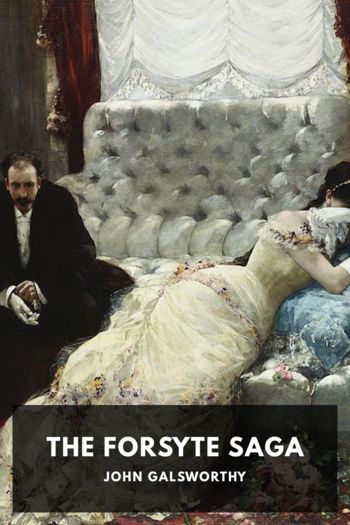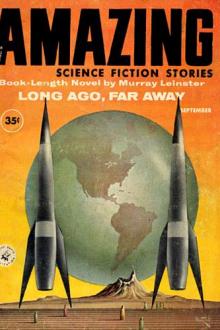The Forsyte Saga - John Galsworthy (best english novels for beginners .txt) 📗

- Author: John Galsworthy
Book online «The Forsyte Saga - John Galsworthy (best english novels for beginners .txt) 📗». Author John Galsworthy
But starved as he was, the whispered sounds in the stillness, the half-seen forms in the dark, acted on him like some morbid stimulant. He left the path along the water and stole under the trees, along the deep shadow of little plantations, where the boughs of chestnut trees hung their great leaves low, and there was blacker refuge, shaping his course in circles which had for their object a stealthy inspection of chairs side by side, against tree-trunks, of enlaced lovers, who stirred at his approach.
Now he stood still on the rise overlooking the Serpentine, where, in full lamplight, black against the silver water, sat a couple who never moved, the woman’s face buried on the man’s neck—a single form, like a carved emblem of passion, silent and unashamed.
And, stung by the sight, Soames hurried on deeper into the shadow of the trees.
In this search, who knows what he thought and what he sought? Bread for hunger—light in darkness? Who knows what he expected to find—impersonal knowledge of the human heart—the end of his private subterranean tragedy—for, again, who knew, but that each dark couple, unnamed, unnameable, might not be he and she?
But it could not be such knowledge as this that he was seeking—the wife of Soames Forsyte sitting in the Park like a common wench! Such thoughts were inconceivable; and from tree to tree, with his noiseless step, he passed.
Once he was sworn at; once the whisper, “If only it could always be like this!” sent the blood flying again from his heart, and he waited there, patient and dogged, for the two to move. But it was only a poor thin slip of a shop-girl in her draggled blouse who passed him, clinging to her lover’s arm.
A hundred other lovers too whispered that hope in the stillness of the trees, a hundred other lovers clung to each other.
But shaking himself with sudden disgust, Soames returned to the path, and left that seeking for he knew not what.
III Meeting at the BotanicalYoung Jolyon, whose circumstances were not those of a Forsyte, found at times a difficulty in sparing the money needful for those country jaunts and researches into Nature, without having prosecuted which no watercolour artist ever puts brush to paper.
He was frequently, in fact, obliged to take his colour-box into the Botanical Gardens, and there, on his stool, in the shade of a monkey-puzzler or in the lee of some India-rubber plant, he would spend long hours sketching.
An art critic who had recently been looking at his work had delivered himself as follows:
“In a way your drawings are very good; tone and colour, in some of them certainly quite a feeling for Nature. But, you see, they’re so scattered; you’ll never get the public to look at them. Now, if you’d taken a definite subject, such as ‘London by Night,’ or ‘The Crystal Palace in the Spring,’ and made a regular series, the public would have known at once what they were looking at. I can’t lay too much stress upon that. All the men who are making great names in art, like Crum Stone or Bleeder, are making them by avoiding the unexpected; by specializing and putting their works all in the same pigeonhole, so that the public know at once where to go. And this stands to reason, for if a man’s a collector he doesn’t want people to smell at the canvas to find out whom his pictures are by; he wants them to be able to say at once, ‘A capital Forsyte!’ It is all the more important for you to be careful to choose a subject that they can lay hold of on the spot, since there’s no very marked originality in your style.”
Young Jolyon, standing by the little piano, where a bowl of dried rose leaves, the only produce of the garden, was deposited on a bit of faded damask, listened with his dim smile.
Turning to his wife, who was looking at the speaker with an angry expression on her thin face, he said:
“You see, dear?”
“I do not,” she answered in her staccato voice, that still had a little foreign accent; “your style has originality.”
The critic looked at her, smiled deferentially, and said no more. Like everyone else, he knew their history.
The words bore good fruit with young Jolyon; they were contrary to all that he believed in, to all that he theoretically held good in his art, but some strange, deep instinct moved him against his will to turn them to profit.
He discovered therefore one morning that an idea had come to him for making a series of watercolour drawings of London. How the idea had arisen he could not tell; and it was not till the following year, when he had completed and sold them at a very fair price, that in one of his impersonal moods, he found himself able to recollect the art critic, and to discover in his own achievement another proof that he was a Forsyte.
He decided to commence with the Botanical Gardens, where he had already made so many studies, and chose the little artificial pond, sprinkled now with an autumn shower of red and yellow leaves, for though the gardeners longed to sweep them off, they could not reach them with their brooms. The rest of the gardens they swept bare enough, removing every morning





Comments (0)